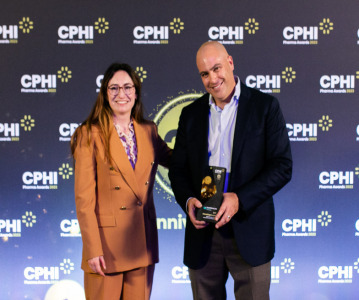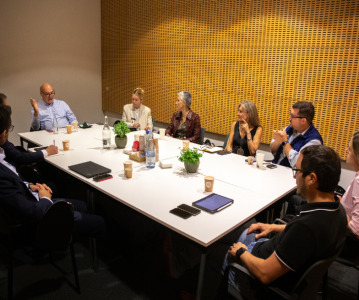Roche latest to report trial delays due to Ukraine war

The war in Ukraine has forced companies to suspend or delay clinical trials in the region.
Roche has become the latest company to report clinical trial delays due to the ongoing war in Ukraine. The company announced on Monday that the conflict is hampering development of multiple sclerosis (MS) drugs, including the experimental BTK inhibitor fenebrutinib, and trials of launched drug Ocrevus.
According to the Swiss firm, about 20% to 30% of patients in the global fenebrutinib MS trial programme have been from Ukraine and Russia.
Head of Roche's pharmaceutical division, Bill Anderson, said: ‘Both Ukraine and Russia historically have been very important contributors to clinical trials for patients with neurological disorders such as multiple sclerosis,’ on a call after the release of first-quarter sales.
The conflict, which began on February 24, has thrown clinical development in the region into disarray. According to the United Nations, more than 11 million people are believed to have fled their homes in Ukraine since then, with about 5.2 million leaving the country.
The war has cut off supply routes throughout Ukraine and scattered participants, making their health records harder or impossible to track. Data collected before the war is also at risk of being destroyed, leaving companies in the position of having to scrap trials that may have been near completion. According to the Ukrainian Association for Clinical Research, many of the materials needed for clinical trials are located in Kyiv, which has seen heavy fighting in recent weeks. These developments can be devastating for patients, especially those with late-stage disease for whom participating in the trial is their last hope.
According to the US Food and Drug Administration’s clinical trials database, there are over 250 active trials with research sites in the country. Of those, 117 involve interventions related to cancer.
Widespread disruptions
Other companies that reported trial disruptions due to the conflict include Merck, Karuna Therapeutics, Pfizer, AstraZeneca and Aeterna Zentaris. Most have suspended screening and enrolment for ongoing clinical trials and paused planning for future studies in the region.
Merck has nearly 60 ongoing trials in Ukraine, the most among all companies operating there. The company said in a statement that it will continue efforts to supply essential medicines and vaccines to the region but will not make further investments in Russia.
In February US-based biotech Karuna Therapeutics wrote in an SEC filing that the timeline for a Phase 3 trial of its ‘blockbuster’ drug for the treatment of schizophrenia was delayed, as 10 of the 19 trial sites are in Ukraine.
Similarly, Aeterna Zentaris was forced to delay recruitment plans for a Phase 3 trial of the oral diagnostic solution Macrilen until 2023. Macrilen is approved to diagnose childhood-onset growth hormone deficiency in adults and the company is now testing the solution in children.
Hubs for clinical development
Clinical trials are long, complex and expensive. On average they take four to six years to complete and require specialised recruitment of diverse patient populations. Routine monitoring and check-ups must take place over a prolonged period of time and every possible side effect or risk must be accounted for. When war breaks out, clinical consistency cannot be maintained and the study’s reliability is eroded.
Ukraine and Russia have become hubs for clinical development in recent years thanks to a few key factors, including patient willingness and lower business costs compared to the US and Western Europe.
Recruitment is extremely robust in both countries, with trial enrolment being completed 3-7 times faster on average than in western nations. Trials offer increased access to medicine otherwise unavailable through local healthcare systems, which has made them a popular option for patients hoping to speed up or improve their treatment. Local investigators are also motivated to drive enrolment, as they receive payment for each patient recruited.
Additionally, Ukraine is home to very early-stage research that precedes human clinical trials. Disruption is expected in the supply chain of intermediates for those doing discovery work, which may have long-lasting impacts on future clinical development.
Considerations for future trials
Nobody knows how long fighting will continue in Ukraine and what the ultimate cost of the war will be. Whatever the outcome, there will be no reality in which trials can pick up exactly where they left off. Even if the original data is still available, the time gap and limited availability to track and treat patients will render much of it useless.
This is the second major upset to clinical development in recent years, after the COVID-19 pandemic shut trials down in 2020.
When it is impossible to complete a clinical trial with the resources available, trials typically migrate to places called rescue sites. This is usually due to a shortfall in participants who meet certain criteria. Clinical trial personnel will know well in advance when a trial needs to be moved and are able to prepare the site for a smooth transition. But when a disruption is sudden or unexpected, as in the case of war or a pandemic, migration to a rescue site becomes much more difficult. For this reason, industry stakeholders have been calling for increased agility in clinical trial practices.
Among several safeguards, companies are advised to take stock of rescue site options and keep information regarding migration plans up to date. They should acquire emergency contact information from participants and trial data should be consistently uploaded to secure cloud databases. The more flexibility that is built into contingency plans, the better.
In a recent report, clinical tech services provider Phesi encouraged companies to utilise all data, including synthetic data, to close knowledge gaps and get trials over the line. It also advocated for the opportunities presented by remote and virtual trials.
Last month, Europe's drug regulator called on clinical trial sponsors to utilise the approaches they developed during the COVID-19 pandemic to continue trial treatment where possible. The European Medicines Agency said its Clinical Trials Coordination Group is developing additional recommendations, but in the meantime stressed that flexibility is vital.
In our role connecting international communities, CPHI/Pharmapack knows first-hand that progress and problem-solving comes from working together, not against one another. We stand firmly with the people of Ukraine, most notably our customers and partners, and their loved ones in the region, and with all who are championing harmony, unity and progress toward peace.
Related News
-
News Pharmapack Awards 2024 Patient-Centric Design Award Winner – Dr Ferrer BioPharma
The 2024 Pharmapack Awards celebrated the best in innovation and design for the pharmaceutical packaging and drug delivery industry on January 24, 2024. -
News Pharmapack 2024 - From the Floor
Paris once again welcomes Europe’s leading trade show in pharmaceutical packaging and drug delivery innovation. Join our content team as Pharmapack 2024 opens its doors to leading experts and innovators in pharmaceutical packaging and drug delive... -
News On Track at Pharmapack 2024 - The Track Sponsor interview: BD Pharmaceuticals
January 2024 brings both a new year and Europe’s leading packaging and drug delivery event. Bringing the world’s experts in pharmaceutical packaging together in Paris, France, Pharmapack 2024 brings exciting opportunities to learn and colla... -
News CPHI Pharma Awards 2023 – API Development and Innovation Winners: Snapdragon Chemistry, a Cambrex Company
After another year of impressive nominations for the CPHI Pharma Awards our winners were announced at CPHI Barcelona in October. In this series of interviews, we speak to the teams behind the award-winning projects, concepts, and technologies. -
News PharmaKure gains authorisation for next stage testing on Alzheimer's treatment
Clinical stage pharmaceutical company PharmaKure gains permission from UK authorities to enter into further testing for PK051 for the treatment of patients with mild cognitive impairment associated with Alzheimer's disease. -
News New Novo Nordisk AI hub for drug discovery to open in London, UK
Danish pharmaceutical giant Novo Nordisk will be opening an AI-based research facility in the heart of London to advance drug discovery operations. -
News Navigating the Future: Challenges and Opportunities in Pharma Innovation and Investment – CPHI Barcelona 2023 Roundtable Report
In this comprehensive downloadable report, hear from a range of experts in finance and investment in the pharma industry on what investment trends will be shaping the future of the industry, in Catalonia, and the wider world. -
News BioNTech to begin mRNA vaccine manufacturing in Rwanda by 2025
German biotechnology company BioNTech has stated their intentions to begin production at their mRNA vaccine factory in Rwanda by 2025, which will mark the first foreign mRNA vaccine manufacturing site on the continent of Africa.
Position your company at the heart of the global Pharma industry with a CPHI Online membership
-
Your products and solutions visible to thousands of visitors within the largest Pharma marketplace
-
Generate high-quality, engaged leads for your business, all year round
-
Promote your business as the industry’s thought-leader by hosting your reports, brochures and videos within your profile
-
Your company’s profile boosted at all participating CPHI events
-
An easy-to-use platform with a detailed dashboard showing your leads and performance


.png)




